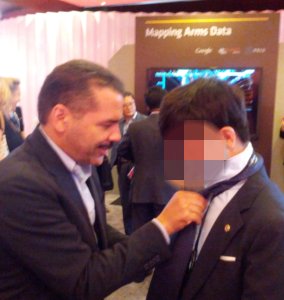As Google’s North Korea Lead, I’ve been working on several projects related to connecting North Korean defectors with various online resources. One recent project was to manage the North Korean panel and workshop (or “lab”) at the Google Ideas INFO Summit that took place in Westlake Village, CA from July 16-18 2012. I invited 10 North Koreans currently living in Seoul to the conference, and their panel and workshop were the highlights of the conference! More on this later. One of the ten North Korean defectors whom I invited was especially captivating. “Paul,” who is just two months younger than I am, had a completely different upbringing than I did, having been born and raised in North Korea before he recently defected. At this conference, we snuck away to a quiet room where he opened up to me and told me his extraordinary story of his will to survive and seek freedom.
At the Google Ideas INFO Summit, Paul had the opportunity to share his story with many of the 250 participants and attendees, including Jane Rosenthal (the co-founder of Tribeca Film Festival), Ronald Noble (the Secretary General of Interpol), Jared Cohen (the Director of Google Ideas), and Eric Schmidt (the Chairman of Google). Each of his new friends were entranced by his personal history, which he told with very little emotion.
Paul led a fairly ordinary life in North Korea, often doing various errands for his mother by illegally sneaking in and out of China in order to make a few dollars to buy food for the two of them. (The average North Korean makes $3-5 USD, and must participate in criminalized market activity to survive.) When he was 15 years old, he saw his mother being arrested for doing business with people outside the country and, according to Section 233 of the North Korean law, she was sentenced to Women’s Prison No. 11 in the South Pyongyang province. Two years later, he learned that she passed away in the camp. He told me that this was the saddest day of his life, for his mother unfairly died at the hands of the North Korean government for merely trying to survive. She did not try to defect, or sell any national secrets. She invested the money she made in China into the North Korean markets, yet she was tried as a national criminal.
In his early teens, Paul developed a brother-like relationship with a North Korean border guard who was trained to shoot-to-kill defectors. For the equivalent of $100 USD, Paul would bribe the guard to sneak North Koreans across the Tumen River and into China. Paul would pay the $100/head fee–and sometimes a pack of cigarettes– to the guard upon his return to North Korea.
After walking the glittering streets of China and illegally watching South Korean dramas that were smuggled into his province in North Korea, Paul decided to defect and hide in China until he could figure out a way to make his way into South Korea. He was unfortunately caught, and was forcibly repatriated back to North Korea, where he was severely tortured daily for eight months, and then was sentenced to a political prison camp for three years.
When he entered the camp for the first time, he was terrified at the sight of emaciated prisoners with hollowed eyes and no human dignity. They performed meaningless and arduous labor tasks from sunrise to sundown, and suffered from not only physical torture, but also excruciating mental pain. People whispered to him that they did not know what crimes they were being sentenced for, yet they did not have the strength to complain. One day, he was sent to the prison ‘hospital,’ where people laid on wooden boards shoulder to shoulder. He saw people cultivate diseases in their own bodies so that they could expedite their deaths, since committing suicide was considered a crime that would punish their loved ones living outside the camps. At the young age of 17, he developed the sense to predict when somebody would die, based on their breathing patterns. Paul recalls thinking, “that man has about two more days left before he leaves this earth.” After a bedmate would pass, Paul would not report his/her death because he would be able to eat the corpse’s food ration. He would continue to sleep next to corpses and eat their foods until nurses noticed the rotting bodies, after which patients would be tasked with carrying the stiff corpses out into a mass open grave. He left the hospital, and went back his barracks, even more determined to survive and defect from this country.
Shortly after he was released from his camp, he defected once more, and after hiding in China for several months, he successfully made his way into Seoul, where he resides today. What shocked me most about his story was not the specific details of a peer who was born and raised under horrific circumstances, but was Paul’s belief that his life was a merely ordinary and normal one. Paul and I communicate about 3-4 times a week via email, Google+, and Kakao talk, and he tells me of the new surprises that he continues to experiences while living in a free society. He realizes that his life in North Korea is one that no person–much less a sovereign government–should ever witness and tolerate. Paul tell me that “[his] body and mind are just starting to understand the novel ideas of human rights and freedoms that [he] is eligible to own, merely by being human.”
Let’s hope that more people around the world are able to learn this lesson that Paul is starting to understand, and that we all continue to educate ourselves with stories such as Paul’s. Only through education and compassion could we help prevent a repeat of such travesties against human life.
If you have any questions about this article or would like to know more about Paul, please do not hesitate to contact me.



